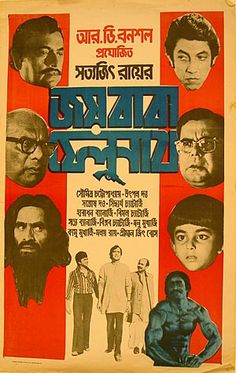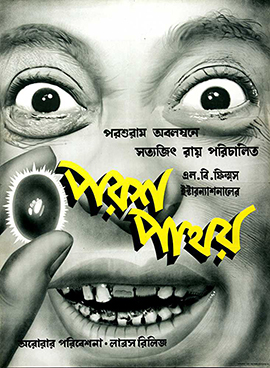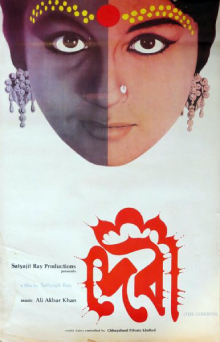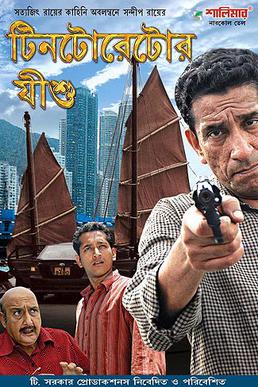Related Research Articles

Joy Baba Felunath is a 1979 Indian Bengali-language mystery film directed and written by Satyajit Ray. Featuring an ensemble cast of Soumitra Chatterjee, Santosh Dutta, Siddartha Chatterjee, Utpal Dutt amongst others, it is an adaption of the eponymous Feluda novel and serves as the sequel of Sonar Kella. Shortly after the demise of actor Santosh Dutta who portrayed Jatayu's role, Ray remarked that it was impossible to ever make a Feluda film again without Dutta.

Charulata is a 1964 Indian drama film written and directed by Satyajit Ray. Based upon the novel Nastanirh by Rabindranath Tagore, it stars Soumitra Chatterjee, Madhabi Mukherjee and Sailen Mukherjee. The film is considered one of the finest works of Ray and is often featured in the lists of the greatest films ever made.

Mahanagar is a 1963 Indian Bengali-language drama film written and directed by Satyajit Ray. Starring Madhabi Mukherjee in the leading role and based on the short story Abataranika by Narendranath Mitra, it tells the story of a housewife who disconcerts her traditionalist family by getting the job of a saleswoman. The film marked the first screen appearance of Jaya Bhaduri, one of Hindi cinema's leading actresses.

Parash Pathar is a 1958 Bengali language Indian fantasy comedy film. It was Satyajit Ray's first film outside of The Apu Trilogy. It was also his first comedy and first magical realist film. Adapted from a short story of the same name by Parasuram, the film offered an early glimpse of Ray's sense of humour, centered on a middle-class clerk who accidentally discovers a stone that can turn other objects into gold.

Nayak is a 1966 Indian Bengali-language drama film composed, written, and directed by Satyajit Ray. It was Ray's second entirely original screenplay, after Kanchenjungha (1962). The story revolves around a matinee idol on a 24-hour train journey from Kolkata to Delhi to receive a national award. However, he ends up revealing his mistakes, insecurities and regrets to a young journalist, who realises that behind all his arrogant facade lies a deeply troubled man as his life's story is gradually revealed through seven flashbacks and two dreams. The film starring Uttam Kumar in main protagonist and Sharmila Tagore played second lead.

Madhabi Chakraborty is an Indian actress. She won the National Film Award for Best Actress for her performance in the Bengali film Dibratrir Kabya. She has acted in some of the most critically acclaimed films in Bengali cinema and is considered one of the great actresses of Bengali cinema.

Devi (transl. Goddess) is a 1960 Bengali-language drama by director Satyajit Ray, starring debutante Sharmila Tagore and Soumitra Chatterjee. It is based on a short story by Prabhat Kumar Mukhopadhyay. The film is based on believing on a dream, that a Zamindar has witnessed, where he is dilutional about his daughter-in-law revealing herself into a Goddess incarnate, worthy of being idolized and worshiped.

Rabindranath Tagore is a 1961 Indian documentary film written and directed by Satyajit Ray about the life and works of noted Bengali author Rabindranath Tagore. Ray started working on the documentary in early 1958. Shot in black-and-white, the finished film was released during the birth centenary year of Rabindranath Tagore, who was born on 7 May 1861. Ray avoided the controversial aspects of Tagore's life in order to make it as an official portrait of the poet. Though Tagore was known as a poet, Ray did not use any of Tagore's poetry as he was not happy with the English translation and believed that "it would not make the right impression if recited" and people would not consider Tagore "a very great poet," based on those translations. Satyajit Ray has been reported to have said about the documentary Rabindranath Tagore in his biography Satyajit Ray: The Inner Eye by W. Andrew Robinson that, "Ten or twelve minutes of it are among the most moving and powerful things that I have produced."

The Inner Eye is a 1972 short documentary film made by Satyajit Ray on Benode Behari Mukherjee, a blind artist and a teacher from Visva-Bharati University, a university founded by Rabindranath Tagore at Santiniketan. The twenty minutes documentary features the life and works of Mukherjee in the form of paintings and photographs, starring himself. The documentary covers his journey from childhood till his blindness along with much of his works and features his words, "Blindness is a new feeling, a new experience, a new state of being". The documentary was awarded as Best Information Film (Documentary) at 20th National Film Awards in 1972.

Sandip Ray is an Indian film director and music director who mainly works in Bengali cinema. He is the only child of the famous Indian director Satyajit Ray and Bijoya Ray.

Karuna Banerjee was a Bengali actress best known for her role in Satyajit Ray's The Apu Trilogy (1955–1959) as the long suffering mother, Sarbajaya. She was nominated for Best Actress at the 1959 BAFTA Awards for her performance in Aparajito (1956), the second part of The Apu Trilogy. She appeared in a number of other films after that, including Ray's Devi (1960) and Kanchenjungha (1962).

The Ganguly family is an Indian show business family active in Hindi cinema (Bollywood). It originates from the Ganguly brothers: Ashok Kumar, Anoop Kumar and Kishore Kumar (née Ganguly).

Satyajit Ray was an Indian director, screenwriter, documentary filmmaker, author, essayist, lyricist, magazine editor, illustrator, calligrapher, and composer. Ray is widely considered one of the greatest and most influential film directors in the history of cinema. He is celebrated for works including The Apu Trilogy (1955–1959), The Music Room (1958), The Big City (1963), Charulata (1964), and the Goopy–Bagha trilogy (1969–1992).[a]

Cinema of West Bengal, also known as Tollywood or Bengali cinema, is an Indian film industry of Bengali-language motion pictures. It is based in the Tollygunge region of Kolkata, West Bengal, India. The origins of the nickname Tollywood, a portmanteau of the words Tollygunge and Hollywood, dates back to 1932. It was a historically important film industry, at one time the centre of Indian film production. The Bengali film industry is known for producing many of Indian cinema's most critically acclaimed global Parallel Cinema and art films, with several of its filmmakers gaining prominence at the Indian National Film Awards as well as international acclaim.

Tintorettor Jishu is a 2008 Indian Bengali thriller film directed by Sandip Ray based on the story of the same name by Satyajit Ray. It is the third film of the New Feluda Franchise, as well as the sequel of Kailashey Kelenkari (2007). Sagar Bhowmik, a Bengali painter painted the depiction of Tintoretto's Jesus used in the film.
Siddheshwari is a 1989 Hindi documentary directed film by Mani Kaul. It is a cinematic portrait of Siddheshwari Devi, a Hindustani classical music singer from Varanasi, India. It was produced by the Films Division of India. The film was awarded the National Award for the Best Documentary for that year in India.

Strir Patra is a 1972 Bengali film, directed by Purnendu Patri, based on a short story by Rabindranath Tagore. Madhabi Mukherjee plays the lead role. Tagore's story, first published in 1914, is considered to be a path-breaking feminist text. The film won the National Film Award for Best Feature Film in Bengali, as well as a number of BFJA Awards.

Aparajito, also known as Aparajito – The Undefeated, is a 2022 Indian Bengali-language biographical film directed and co-written by Anik Dutta. Produced by Firdausul Hasan and Probal Halder under the banner of Friends Communication, it is based on the making of the cult classic film Pather Panchali by Satyajit Ray. The film, being shot in black and white, stars Jeetu Kamal in the titular role of Aparajito Ray.
Anjangarh is a 1948 Bollywood drama film, directed by Bimal Roy. It stars Sunanda Bannerjee, Tulsi Chakraborty, Raja Ganguly, Hiralal, and Bipin Gupta. Dialogues were written by M Bajpayee.
References
- ↑ "Revisiting Satyajit Ray's Devi: The enduring relevance of the film's biting critique of dehumanisation of women". Firstpost. 1 July 2020. Retrieved 5 November 2020.
- ↑ Andrea Viggiano (15 October 2020). "Al via la Retrospettiva dedicata dalla Festa del Cinema a Satyajit Ray". NonSoloCinema (in Italian). Retrieved 5 November 2020.
- ↑ "Seven years after ban, Maoist leaders hold first public meeting in Bengal". Hindustan Times. 30 August 2016. Retrieved 5 November 2020.
- ↑ "Purnendu Mukherjee". IMDb. Retrieved 6 December 2020.[ unreliable source? ]